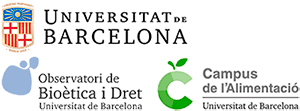The Bioethics and Law Obs.
Master in Bioethics and Law
Master in Food Ethics and Law
UNESCO Chair in Bioethics
Contact
- Bioethics and Law Observatory
- UNESCO Chair in Bioethics
- University of Barcelona
- Faculty of Law
- Ave. Diagonal, 684
- 08034 Barcelona
- (+34) 93 403 45 46
- obd.ub@ub.edu
- Master in Bioethics and Law
- (+34) 93 403 45 46
- master.bd@ub.edu
Research line "Bioethics, Food and Law"
 Presentation
Presentation- Research lines
- Food Law
- Ethics in the food chain
- Food & Health Policy - Education
- Partners
Presentation
Food Choice and Gastronomy have reached a significant place in the social debate. The discurse on how to choose a particular food (either because of its nutritional content, its method of production or its origin, among others) has become mainstream. Food & Gastronomy have evolved into a thriving industry with important political and economic consecuences. In the XXIst century, individuals have overcome the idea that food consumption is based purely on survival and the wide variety of foodstuffs available today allows the citizen-consumerto express moral, political and social concerns through precise food choices (Raventòs, 2009).
Consumers today expect food not only to be safe but also respectful with their beliefs. As Singer put it in 2007, consumers casts their ballot every time they make a food choice. Public institutions around the globe have become aware of this reality, and have thus adopted both policy and legislative initiatives to protect consumers rights and safety.
Food Law, particularly in the European Union, boosted in the last 10 years. Similarly, extense research funding and strong innovation strategies have allowed for the consolidation of new categories of food products that respect most varied ethical concerns. Organic production and local food networks among others, take their share of the Food & Health debate. Also, the complexity of new technologies for food innovation (such as nano applications or synthetic biology) has again put on the table the discussion about the acceptability of specific food technologies In this context, there is a need for a multidisciplinary and participatory analysis of the ethical implications of food production schemes and the omission of this task can -as recalls the case of Monsanto in the European market- result in the condemnation of new technologic initiatives (Owen, 2009) after millionaire investments. Food research needs to be accompanied by the study of the legal framework and the ethical implications of the proposed research.. Thus, this research line seeks to identify and analyze ethical and socio-political issues that may arise from food research & innovation and its impact in modern societies.
Research lines
- Food Law
- Food safety law.
- Human and Social Rights & Diet: Towards a Right to Food?
- Legal aspects of risk assessment of food innovation. - Ethics in the food chain
- What are the ethical conflicts affecting food research?
- How do we establish a framework for ethical review of the global food chain?
- Food Sovereignty in the XXI century: challenges and opportunities. - Food & Health Policy
- Political dynamics among the the food industry, public authorities and civil society in the design of public policies on food and health.
- Evolution of global food policy. Public participation in decisions on the management of the global food chain.
- Food Sharing & Digital single market.
Education
“Master in Food, Ethics and Law” (60 ECTS)
The food and drink industry and require for graduates from scientific disciplines such as chemistry, food technology or agricultural engineering that are able to ensure that their products and projects comply with the applicable legal requirements. On the other hand, research professionals need to take into account the ethical implications of their reaserch, as citizen-consumers often evaluate projects on the grounds of their moral and political expectations.r Faced to this realityd, the EU's research policy highlights the importance of ethical research review when selecting which projects to fund. Thus, food professionals must develop multidisciplinary skills that allows them toassessthe acceptability of their innovations.
In this context, the Master in Food Ethics and Law provides specific training a from a multidisciplinary perspective.
Although primarly aimed at graduates from scientific disciplines such as Food Technology, Human Nutrition & Dietetics, or Food Engineers,¡ it also provides with effective training for third Sector professionals who want to develop their activities in the field of food security as well as for lawyers, journalists or professionals from the social sciencies whose activity require specific knowledge on this field.
Partners
The research line participates in several research and training networks analysing the ethical, political and legal implications of food systems.
Our partners include the following:
 Food Law & Policy Clinic
Food Law & Policy Clinic
Harvard Law School
 Law & Governance Group
Law & Governance Group
Wageningen University
 Global Food Ethics and Policy Program
Global Food Ethics and Policy Program
Johns Hopkins Berman Institute of Bioethics




